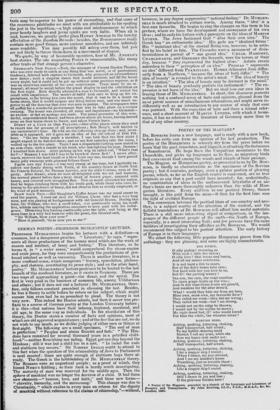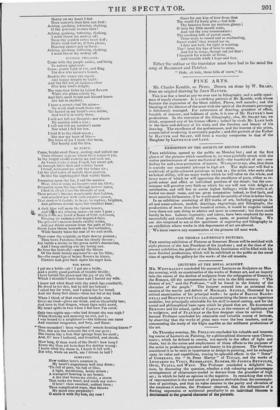POETRY OF THE MAGYARS.*
DR. BOWRING learns a new language, and is ready with a new book, before his critic can form an opinion of his last production. The poetry of the Hungarians is scarcely dry from the press before we learn that the poet, translator, and linguist, is attacking the fastnesses of Scandinavia. He hops from the Carpathian mountains to the Doorefelds, and picks up languages as he flies, as migratory birds find convenient food among the woods and islands of their passage. The Magyar, or Hungarian poetry, as presented to us by Dr. Bow- RING, is hardly so characteristic as the specimens of the Servian poetry ; but it contains, perhaps, even a greater portion of pleasing poems, which, as far as the English reader is concerned, are as true originals as any that a poet could have invented ; for, undoubtedly, no combination of ideas in the undiscovered labyrinths of an au- thor's brain are more thoroughly unknown than the wilds of Hun- garian literature. Every- addition to our poetical library, thence brought, is like gold from the mine—it then for the first time sees the light of civilized Europe. The con,nexion betWeen the poetical ideas of one country and ano- ther, is g subject worthy of the attention of the student, and the faithful translations of Dr. BOWRING Will afford him useful materials. There is a still more interesting object of comparison, in the lan- guages of the different people of the earth—the North of Europe, especially, is a most interesting field; and few persons have the same facilities of investigating their affinities as Dr. BOWRING. We would recommend this subject to his patient attention. The early history of Europe is in their languages." We select the following little popular Hungarian pieces from this anthology: they are pleasing, and some are highly characteristic.
THE PIPKIN.
0 silly pipkin storming so With such a little fire below; 0 silly love ! that burns and burns, And all my senses overturns.
It is not hard a fish to snare, But of the fish's bones take care; Not hard with her you love to be, But 0! the parting misery !
The sun, the rain, the wind combine To ripen grape-fruits on the vine ; And in due time those fruits are press'd. And maidens for the altar dress'd.
What! would they hide me from v love, Mine own, mine own, my favourite dove ? They called me weak—they did me wrong; They called me weak—but I am strong.
I would not on the ridge be thrown, I would not by the scythe be mown ; My right-hand lost, 0! who would knead For thee the white, the wheaten bread ?
DANCING SONG.
Aching, quaking, tottering, shaking, Half transported, half afraid ; To my lightly-dancing maid Stretch I out my arms, while she Sees my knees sink under me: Aching, quaking, tottering, shaking, Half transported, half afraid.
Aching, quaking, tottering, shaking, Like a magpie skip I round ; When I dance, my joys abound, And I see my maiden's knees Trembling, just as tremble these :
Aching, quaking, tottering, shaking, Like a magpie skip I round.
Aching, quaking, tottering, shaking, Still I dance in joy and fear ; 0 the grievous burden here!
•
* Poetry of the Magyars, preceded by a Sketch of the Language and Literature of Hungary and Transylvania. By John Hovering, LL.D., F.L.S., M.R.A.S, &c. &c. London, MO.
Heavy on my heart I feel More concern than love can heal : Aching, quaking, tottering, shaking, 0 the grievous burden here !
Aching, quaking, tottering, shaking, I must throw my nadrag off; Thou thy maiden robes must doff; Death shall find us, if thou please, Dancing dances gay as these :
Aching, quaking, tottering, shaking, I must throw my nath.ag off.
EVENING TWILIGHT.
Come with thy purple smiles, and bring To nature quiet rest : Come, gentle light.of eve, and fling The dew o'er nature's breast.
Send to the weary eye repose And happy dreams to-night : And hid the veil of darkness close O'er holy love's delight.
The rose-tree hides its fairest flowers While eve glides calmly by, And life's most bright and blessed hours Are hid in mystery.
I have a secret—but 'tis mine—
No word shall reach thine ear; 'Tis buried in my heart's own shrine, And lock'd in safety there.
I will not tell my thought—nor shame My maiden with a tear; I will not tell my maiden's name Nor what I feel for her.
I told it to the silent moon ;
She saw my hour of bliss—
The tears of joy I shed—the boon, The beauty and the kiss.
TO FANCY.
Come, bright-eyed Fancy, smiling, and unlock me
Those dreamy regions where thou reig.nest yet; In thy bright cradle curtain me and rock me, As Venus rocks young Cupid, her sweet pet. As through life's dark and solitary forest I tread, surround me with thy balmy air ; Let the glad notes of melody thou pourest, Be like the nightingales' that warble there.
Dreaming upon thy lap, I call the maiden . Mine, who is mine no longer—and am blest ; Dreaming upon thy lap—though sorrow-laden, I find in silent tears the thought of rest.
Thou misery's burden wondrously (lost lighten, And minglest joy with such creative power, That shadow'd doubts, to hope, to rapture, brighten, And patience dawns upon the troubled hour.
A dark blue veil noon the future lowers, And hits lny omine doom—in vain I gaze ; • While from my heart :flame of light uptowers, Flinging its radiance o'er departed days.
The present's narrow limits swiftly widen, And joy drives sorrow from the path of life ; Sweet roses bloom beneath my feet unbidden, While beauty takes the seat of wo and strife.
Then come the sylphids on their downy pinions; Then bows Favonius from his cloudy throne; Joy builds a shrine in the green earth's dominions, And I bang smiling o'er my loving one. So lives the butterfly—amidst the blisses Of the fresh breeze enamour'd—on his bliss; So—the sweet lips of balmy flowers he kisses, Flowers that give back again his eager kiss.
THE BRIDE.
got me a bride—ah ! I got me a bride, And a pretty good portion of trouble beside; I have buried the peace and the joy of my life, Which I shouldn't have done had I buried my wife.
I know not what fiend with the witch has combin'd; He dived to his den, but he left her behind : I asked her for wine, and I asked her for bread, And she flung first abuse—then her list at my head.
When I think of that excellent landlady who Gives me food—gives me drink, and so cheerfully too; And turn to that dragon, whom tiger-milk nurst, My heart splits in two when I feel how I'm curst.
Only two nights ago—who had dreamt she was nigh ? When thinking and meaning no evil, not I; I was bound to a neighbour's—the hideous one came And vomited vengeance, and fury, and flame.
"Thou scoundrel ! thou vagabond ! wench-hunting knave !" This, this was the welcome the evil one gave; She roared like a lion that springs from his nook ; And, 0! how I tottered, and trembled, and shook.
How long, 0 thou work of the Devil ! how long ? Every day thou art here does thy destiny wrong: I know what thy doom is, I know it full well ; But why, while on earth, am I driven to hell ?
SYMPATHY.
How sudden love's creation is My heart's experience well may deem ; 'Tis full of pain, 'tis full of bliss, A light, mysterious, lovely dream' A transport heaving in my breast, A fire that burns my cheeks, a storm That rocks my heart, and rends my rest- 0 love! thou sweetest, saddest form; Thou complicated maze, that throws My mind into perplexity! 0 sooth it with thy kiss, my rose ! Since for one kiss of love from thee The world I'd freely give ;—but hide Thy beauties from my anxious glance ; 0 turn thy little mouth aside, .And veil thy rosy countenance : Thy swelling hills of purest snow, Thine arms so round and so enchanting, Sweet violet ! they wound me so, I dare not look, for light is wanting.
Nay ! bend thy lips of love to mine, And list to songs, though sad yet dear : I languish for a smile of thine, And tremble while I hope and fear.
Either the author or the translator must have had in his mind the song of Beaumont and Fletcher.
" Hide, oh hide, those hills of snow," &c.



















 Previous page
Previous page